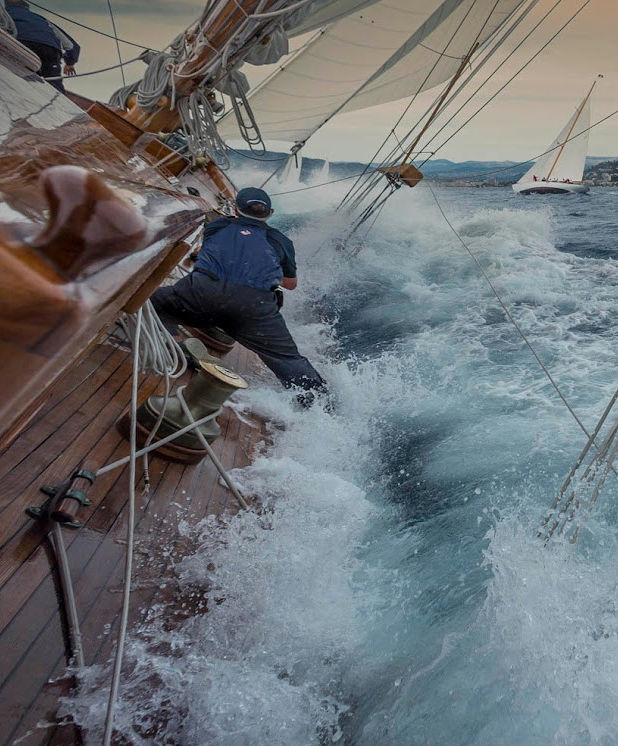America’s journey is the Christian pilgrimage that cannot end with an earthly goal. Thus, Huckleberry Finn is an exemplar of Christian literature as much as is The Pilgrim’s Progress. The journey is motivated not by the destination but by the restlessness of the pilgrim. There is only one possible conclusion to Huck’s adventure: His journey must resume, as he announces in the book’s last line: “But I reckon I got to light out for the Territory ahead of the rest, because Aunt Sally she’s going to adopt me and sivilize me, and I can’t stand it. I been there before.”
To the ancient Greek a person can come to know reality, meaning, the Real is finite. To the ancient Hebrew and Christian a person can never know reality because it is essentially unsearchable. Created beings can never fathom the divine will. This comports with the old Hebrew idea that Gods’ name is unpronounceable – being vowels only – Yod He Vav He rendered in Latin as YHVH. It also is more a verb than a noun. The doctrines in the Qabala are precursors of Christian orthodoxy. So, even though unknowable in ‘this’ life, the fruit of ascending to heaven is full revelation of the Real in the after life. Here, below, we must live by grace. Put another way, for the Hebrew/Christian, the full truth about reality is in a separate realm accessible only when certain conditions are met in the death of the individual. Is this not prideful of man to think by the grace of god that what is in essence a man generated account of the ultimate workings of the cosmos have been revealed only to him?
So, “As principle, power,….it is Christianity that first posited sensuousness into the world.” (Kierkegaard) Western sensibility can best be understood if looked at in this light. As principle, arché (from or in the beginning), sensuousness was first posited by Christianity, and this is opposed by the Hebrew davar, meaning word, or speech. The Greeks thought the cosmos finite and equivalent and that logos and psyche inform reality throughout. The Hebraic universe is orderly because God would not deceive us; he is bona fide, as Descartes put it. For Christianity, God informs reality, creating it anew each moment. For Greeks, logos, psyche, cosmos inform reality by being, becoming, or keeping reality. The word of God is not reality, not divine, not any more than our words are us. Logos is the real, and it hides behind appearances. God is faithful, but unsearchable; his being is not exhausted in his deeds. Neither is ours. We are complete only in an ever disappearing event on an ever receding horizon. Gratification of the senses supplants having this future completion; we’re deprived of being whole so the unfillable void in us becomes a daemonic urge – Don Juanism. Satiety ever escapes us remaining forever unachievable like that point of being fully real in an ever disappearing future event.
The historical corollary is the Israelites being ‘brought’ out of Egyptian bondage. Likewise the world, in the biblical account, was ‘brought’ out of the void. This pattern repeats when, we will be, in the fullness of time – upon the perfect realization of creation – ‘brought’ out of this world, apocalyptically, and into heaven and into complete, whole eternal beings with perfect incorruptible bodies.
Kierkegaard, through his “Author A” states that Christianity posits sensuousness as its own opposition in that the spirit sees the ego as separate and evil. “Beware of worldly things, the ‘ways’ of the flesh.” So not only is man irrevocably incomplete, he is self loathing, which feeds the daemonic urge adding or enhancing his restless tumultuous race to infinity. Poteat thought, along with Kierkegaard that in the music of the opera Don Giovanni, Mozart actually expressed in sound this restless urge. In Christianity and Don Juanism the sensuous is not related to the “senses” so much as to a kind of spirit. It is a discarnate sensuousness. Coming to dwell in this feeling is an elevation or transfiguration of the sensuous out of the body to the level of a spirit. This is the birth of the daemonic. The daemonic prevents us from having proper reverence for the absolute other, if, indeed there is that – I don’t think so – and leads us on a blind path searching a universal culmination of the restlessness, tumult, the erroneous sense of infinity that is its heritage. We literally and forever teeter on history’s brink ever racing to a disappearing point on the horizon the sense of being complete in ourselves, the sense of wholeness impossible to reach.
This is a most abstract idea and has a minimum of bearing on me as I am in the world and which thus tends to take me out of the world. The most abstract medium is the medium which makes a minimum of reference to man as a spatial temporal creature and which thus tends to take him out of his being in the world. Put another way it is an escape from what is to what might be. Don Juanism, in one sense the erotic in nature gone wild, was sprouted from the seed of the insane drive to achieve salvation, personal completeness, only by union with an absolute other in a reality disconnected from life.
There is no cure for this malady unless it might be complete annihilation, which seems to be where we are headed. Western man has morphed into a creature that is permanently estranged from himself and reality.


